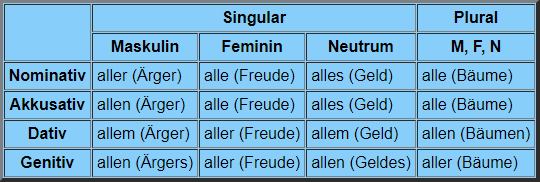
Definition in Singular: Das ganze, gesamte. All- (Singular) bezeichnet eine Gesamtheit, etwas in seinem ganzen Umfang (in singular form, all- designates a whole, something in its entire extent).
Definition in Plural: All bezieht sich entweder auf eine Gesamtheit von einzelnen Gliedern, oder auf die einzelnen Glieder einer Gesamtheit (in plural form, "all-" designates an entirety of individual members, or comprises all individual members of a whole set of members).
Illustrating examples: aller Schmerz, mit all seiner Habe, all das Schöne, allen Ernstes, diese alle, alle beide (= each of both), alle die geladen waren (= all those invited), sie kamen alle, ich grüße Euch alle, alle ehrlichen Menschen, all die Fehler, alle Anwesenden.
Application Examples
Alles oder nichts. (= Everything or nothing) - Nom., Sing, Neuter
Er hat alles Geld verloren. (= He has lost all the money) - Akk., Sing., Neut.
Bei aller Bewunderung blieb sie skeptisch. (Despite all her admiration, she remained sceptical.) - Here, aller is attribute of Bewunderung, hence it is Dativ, Singular, Femininum.
It is only for ease of memorizing that we add the nouns (parantheses), the pronoun accompanying these arbitrarily chosen nouns. The form of declension of all- is the same as that of adjectives under class I, i.e. strong.
All- is also used as amplifier, as in "all dies verdanke ich dir", an amplified alternative to "dies verdanke ich dir". The amplifier does not get declined.
All = das ganze, gesamte, as in "mit aller Kraft", which means the same as "mit der gesamten Kraft" (mit wem? --> Dat., Sing., Fem.)
 英语
英语 日语
日语 韩语
韩语 法语
法语 西班牙语
西班牙语 意大利语
意大利语 阿拉伯语
阿拉伯语 葡萄牙语
葡萄牙语 越南语
越南语 俄语
俄语 芬兰语
芬兰语 泰语
泰语 丹麦语
丹麦语 对外汉语
对外汉语

